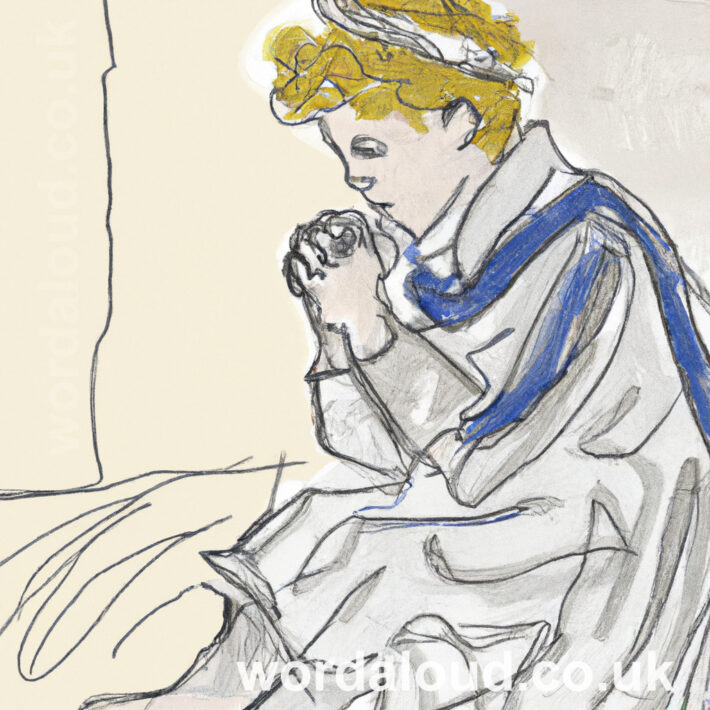Christian Art | Prayer With Jesus | Psalms | God’s Faithfulness To Israel | King David As A Boy | Audio KJV | Love Revealed By Jesus Christ | King James Audio Bible
Psalm 105 | King James Audio Bible
YouTube: Psalm 105 | KJV | King James Version | Audio Bible | Word Aloud
Psalm 105, a hymn of praise in the Hebrew Bible, is testament to God’s enduring faithfulness and mighty deeds throughout the history of Israel. This psalm is a celebration of God’s covenant with Abraham and the fulfilment of God’s promises through subsequent generations, culminating in the deliverance of the Israelites from Egypt and their journey to the Promised Land.
Historical And Theological Context
Psalm 105 is deeply rooted in the historical narrative of the Israelites. The psalm opens with a call to give thanks and proclaim God’s deeds, a theme that resonates throughout the psalm. The historical recollections in Psalm 105 are not merely a rehearsal of past events; they serve to remind the Israelites of their unique relationship with God, defined by the covenant made with their ancestors. This covenant, a central theme in the psalm, is seen as an eternal and unbreakable promise from God, stretching from Abraham to the present day.
Theological interpretations of Psalm 105 often highlight God’s role as the active agent in history. The psalm recounts divine interventions, such as the sending of Joseph to Egypt and the plagues, which compelled the release of the Israelites, emphasizing God’s sovereignty and providential care. This recounting serves to reinforce the Israelites’ trust in God and encourages them to adhere to God’s laws and statutes.
Literary Style And Structure
Psalm 105 is a fine example of Hebrew poetic tradition. Its structure and style are characterized by parallelism and repetition, common features in Hebrew poetry. The psalm uses vivid imagery and metaphors to describe God’s mighty acts, creating a narrative that is both poetic and powerful. The repetition of key phrases, such as ‘His marvellous works’, serves to reinforce the central themes and to aid in memorization, an important aspect in the oral tradition of ancient Israel.
Significance In The Book Of Psalms And Biblical Canon
As part of the Book of Psalms, Psalm 105 contributes to the larger purpose of the Psalter. The Psalms, often referred to as the hymnbook of ancient Israel, encompass a range of human emotions and experiences, from despair to exultation. Psalm 105, with its focus on God’s faithfulness and mighty works, offers a perspective of hope and assurance in God’s unchanging nature.
In the wider context of the biblical narrative, Psalm 105 serves as a bridge between present time and the patriarchal stories of Genesis and the Exodus narrative. The psalm provides a theological interpretation of these events, viewing them through the lens of God’s faithful actions in history.

Psalm 105 | King James Audio Bible
O give thanks unto the LORD; call upon his name: make known his deeds among the people.
Sing unto him, sing psalms unto him: talk ye of all his wondrous works.
Glory ye in his holy name: let the heart of them rejoice that seek the LORD.
Seek the LORD, and his strength: seek his face evermore.
Remember his marvellous works that he hath done; his wonders, and the judgments of his mouth;
O ye seed of Abraham his servant, ye children of Jacob his chosen.
He is the LORD our God: his judgments are in all the earth.
He hath remembered his covenant for ever, the word which he commanded to a thousand generations.
Which covenant he made with Abraham, and his oath unto Isaac;
And confirmed the same unto Jacob for a law, and to Israel for an everlasting covenant:
Saying, Unto thee will I give the land of Canaan, the lot of your inheritance:
When they were but a few men in number; yea, very few, and strangers in it.
When they went from one nation to another, from one kingdom to another people;
He suffered no man to do them wrong: yea, he reproved kings for their sakes;
Saying, Touch not mine anointed, and do my prophets no harm.
Moreover he called for a famine upon the land: he brake the whole staff of bread.
He sent a man before them, even Joseph, who was sold for a servant:
Whose feet they hurt with fetters: he was laid in iron:
Until the time that his word came: the word of the LORD tried him.
The king sent and loosed him; even the ruler of the people, and let him go free.
He made him lord of his house, and ruler of all his substance:
To bind his princes at his pleasure; and teach his senators wisdom.
Israel also came into Egypt; and Jacob sojourned in the land of Ham.
And he increased his people greatly; and made them stronger than their enemies.
He turned their heart to hate his people, to deal subtilly with his servants.
He sent Moses his servant; and Aaron whom he had chosen.
They shewed his signs among them, and wonders in the land of Ham.
He sent darkness, and made it dark; and they rebelled not against his word.
He turned their waters into blood, and slew their fish.
Their land brought forth frogs in abundance, in the chambers of their kings.
He spake, and there came divers sorts of flies, and lice in all their coasts.
He gave them hail for rain, and flaming fire in their land.
He smote their vines also and their fig trees; and brake the trees of their coasts.
He spake, and the locusts came, and caterpillars, and that without number,
And did eat up all the herbs in their land, and devoured the fruit of their ground.
He smote also all the firstborn in their land, the chief of all their strength.
He brought them forth also with silver and gold: and there was not one feeble person among their tribes.
Egypt was glad when they departed: for the fear of them fell upon them.
He spread a cloud for a covering; and fire to give light in the night.
The people asked, and he brought quails, and satisfied them with the bread of heaven.
He opened the rock, and the waters gushed out; they ran in the dry places like a river.
For he remembered his holy promise, and Abraham his servant.
And he brought forth his people with joy, and his chosen with gladness:
And gave them the lands of the heathen: and they inherited the labour of the people;
That they might observe his statutes, and keep his laws. Praise ye the LORD.
Psalm 105 | King James Audio Bible
- Divine Faithfulness And Covenant: The psalm emphasizes God’s steadfast faithfulness to His covenant with Abraham and his descendants, underscoring the unbreakable promise made by God to the patriarchs.
- Historical Recollection: The psalm recounts key historical events in Israel’s history, such as the story of Joseph, the Exodus, and the journey to the Promised Land, highlighting God’s intervention and guidance.
- God’s Sovereignty And Providence: The psalm portrays God as the supreme power orchestrating events in history for the benefit of His chosen people.
- Call To Praise And Worship: The psalm begins with an exhortation to give thanks, sing to God, and remember His wonderful works, encouraging worship and praise as a response to God’s actions.
- Remembrance And Teaching: Through recounting the deeds of God, the psalm serves as a tool for teaching and reminding the Israelite community of their unique identity and history.
- God’s Protection And Justice: The psalm illustrates how God protects His people and executes justice on their behalf, especially against powerful adversaries.
- The Fulfillment Of Promises: The psalm emphasizes the fulfilment of God’s promises, particularly in granting the land of Canaan to the Israelites, as a testament to His reliability and truthfulness.
- Universal Scope Of God’s Rule: While focusing on Israel, the psalm also acknowledges God’s dominion over all the earth, indicating a universal aspect of God’s rule and providence.








